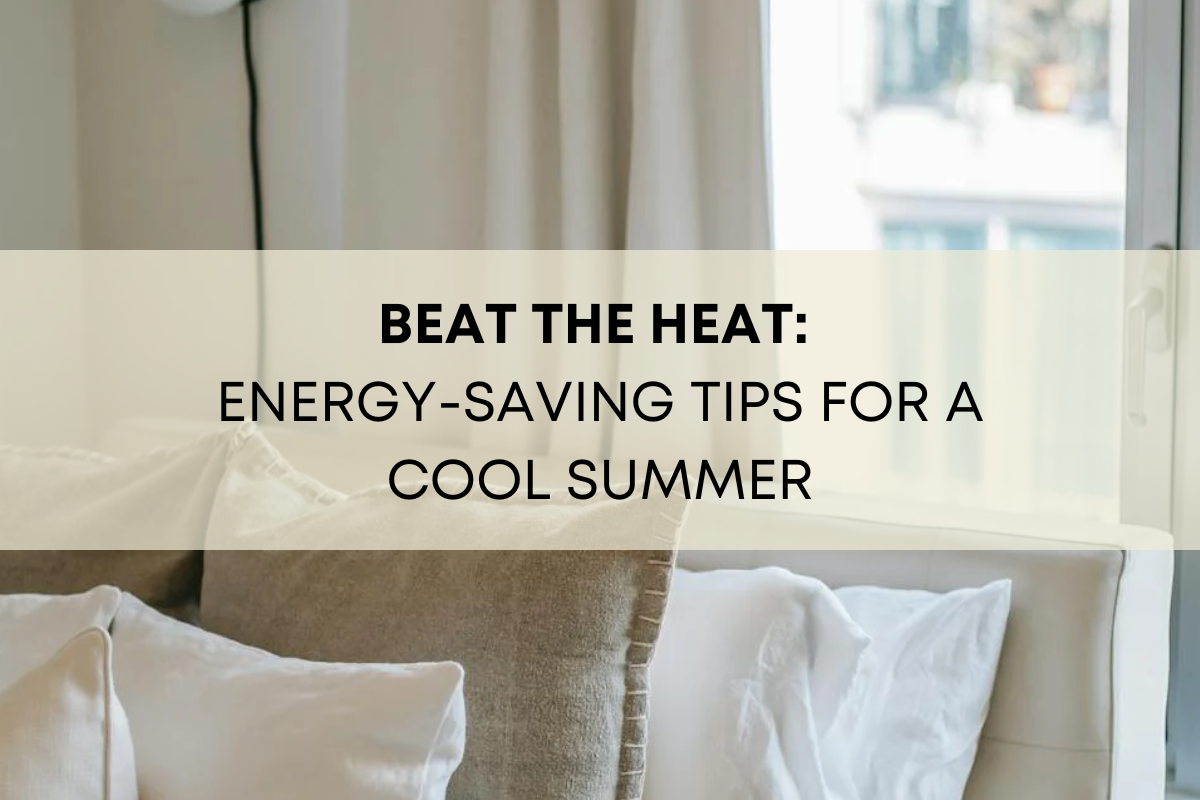Beat the Heat: Energy-Saving Tips for a Cool Summer

As the summer heat rolls in, staying cool becomes a top priority for many households. However, keeping your home comfortable doesn’t have to come at the expense of skyrocketing energy bills or environmental impact.
Air conditioners have become increasingly popular and almost the norm in all U.S. households. They provide cooled air for your home, keeping it at a comfortable temperature, but air conditioners have major downfalls and are the reason why we are writing this blog post. Air conditioners:
- increase energy demand accounting for about 10% of electricity consumption worldwide;
- emit greenhouse gasses and currently account for almost 4% of the world’s overall greenhouse gas emissions;
- And the refrigerants and hydrofluorocarbons (HFCs), which are required for an air conditioner to properly function, pollute the atmosphere and contribute to ozone depleting substances (ODS).
This blog will guide you through a variety of ways you can stay cool without over-relying on your AC. From using natural ventilation to cooking outdoors, there are several ways you can reduce your carbon footprint whilst staying cool this summer (and beyond).
Embrace Natural Ventilation
Your home has windows for a reason! They’re not just for looking out — they are a great way to allow fresh air circulation into your home without overheating your home. Stay cool by allowing cross ventilation, this means opening windows on opposite sides of the home to create a cooling breeze.
At nighttime, you can take advantage of the cooler evening temperature by opening the windows & using fans instead. This not only helps to cool down your home naturally, but reduces energy consumption during peak demand hours.
Use Your Blinds or Shades
The sun is a powerful heater for your home. By closing your blinds or curtains during the hottest parts of the day, you will block out sunlight and reduce indoor temperatures. Consider blackout curtains or reflective curtains to further minimize heat gain from direct sunlight, or even insulated curtains for your windows that receive a lot of sun exposure to help reduce heat transfer.
Reduce Heat Sources Indoors
Certain appliances in the home actually contribute to heating up your home, without even knowing it. As your stove, dishwasher, and dryer run, it’s not only using up energy, but also heating up the room and space as it heats up itself.
- Cook outdoors: Instead of cooking indoors with the stove, why not take your culinary skills outside and grill your meals instead? Outdoor cooking not only helps to keep your home cooler, but also provides you with an opportunity to enjoy the outdoors and summer sun.
- Line dry your clothes: Save energy by air-drying your clothes on a clothesline or drying rack outdoors. This not only conserves energy, but prolongs the life of your clothes.
-
Air dry your dishes: instead of using the dishwasher, wash your dishes and dry them on a rack instead. This small adjustment is not only great for the environment, but reduces energy consumption and prevents unnecessary heat from the high temp dry cycle from warming up your home.
Incorporate Fans
Whether you are using it during the day or night, fans are a great way to circulate the air throughout your home. Ceiling fans and oscillating fans can create a comfortable breeze that helps regulate the temperature without needing AC. If you are using AC, fans can still help to distribute the cooled air more efficiently, which means you can set your thermostat a few degrees higher while still reaching a comfortable temperature and saving cooling costs and energy.
Regular Maintenance
Conducting regular maintenance as well as replacing your air filters often on your cooling system and keeping it in peak condition will not only ensure energy efficiency, but will also ensure optimal airflow throughout your home. When you are purchasing new appliances for your home, you should also consider looking for the Energy Star label to ensure they meet high energy efficiency standards, which not only consume less energy to run, but also save you money on utility bills.
By implementing these energy-saving tips, you can more effectively beat the summer heat while reducing your carbon footprint, and most importantly: save you money! These tips help move you towards living a greener lifestyle where you are less energy-dependent.
Which of these tips are you implementing to cool down this summer?
Sources:
Recent Blog Posts
Discover more tips on living #ZeroWaste!
-

How to Celebrate Earth Month: 10 Actions to Make a Difference
Earth Month is the perfect time to take action for the planet. In this post, we share 10 simple actions you can take this month to celebrate Earth Month and reduce your ecologic...
Read more -

Why Choose a Plastic-Free, Zero-Waste Lifestyle?
Plastic waste is everywhere, but small swaps can make a big impact. Reduce single-use plastic, shop in bulk, and choose sustainable alternatives. Tare Market is here to help you...
Read more -

Celebrating Women Makers: Women-Owned Brands at Tare Market
Celebrate International Women’s Day with Tare Market by supporting women-owned brands that are making a difference in sustainability and entrepreneurship. From eco-friendly clea...
Read more



